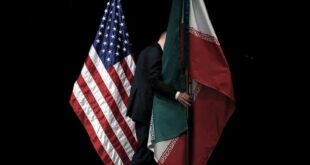Iranian President Mahmoud Ahmadinejad’s announcement Wednesday that Iran had 3,000 working centrifuges raised fears in Washington that Israel would respond to the statement with a preemptive military strike, the Times reported Thursday.Â
Â
Â
The British paper quoted military sources in the US capital as saying that the figure presented by Ahmadinejad could be the “tipping point” that touches off an IAF strike. Washington was reluctant to go forward with a strike against Iran, but Israel was a “different matter,” the officials said.
Â
Even before the Iranian president’s announcement US defense officials told the Times that “Israel could do something when they get to around 3,000 working centrifuges. The Pentagon is minded to wait a little longer.”
Â
Concern over an Israeli strike has been “heightened” following the September 6 strike on a target suspected to belong to a Syrian nuclear program, the paper said.
Â
On Wednesday night, hours after Ahmadinejad’s announcement, Defense Minister Ehud Barak said a military operation was a viable option for dealing with the Iranian nuclear threat.
Â
“We cannot take any option off the table and we need to study operational aspects,” Barak said at a Labor Party meeting in Beersheba, adding that he could not go into detail. “This is not just for the coming months but also for the coming two years,” he said.
Â
The new developments in Iran meant Israel had to hold a serious debate on the issue, Barak said. “We need to have a comprehensive discussion and to act when it comes to thwarting, gathering intelligence and [imposing] sanctions,” he added.
Â
Barak reminded his audience of Military Intelligence’s assessment that Iran, if not stopped, could obtain a nuclear weapons by the end of the decade.
Â
“Intelligence officials gave us an estimate that things are moving forward, and the assessment is that it will take between three and four years,” he said. “That goes by very quickly.”
Â
Barak said the world needed to take additional diplomatic action against Iran as well as economic steps that would cut off funding for the country’s nuclear program.
Â
Ahmadinejad announced that Iran has achieved a landmark, with 3,000 centrifuges fully operational in its uranium enrichment program.
Â
“We have now reached 3,000 machines,” Ahmadinejad told thousands of Iranians gathered in Birjand, eastern Iran, in a show of defiance of international demands to halt the program believed to be masking the country’s nuclear arms efforts.
Â
Ahmadinejad has previously said Iran had succeeded in installing the 3,000 centrifuges at its uranium enrichment facility at Natanz. But Wednesday’s claim was his first official statement that the plant is now operating all those centrifuges.
Â
When Iran first announced launching the 3,000 centrifuges in April, the UN nuclear watchdog agency, the International Atomic Energy Agency, said Teheran had only 328 centrifuges up and running at Natanz’s underground facility.
Â
In a recent report, drawn up by IAEA chief Mohamed ElBaradei, the agency put the number of centrifuges working in Natanz at close to 2,000, with another 650 being tested.
Â
Although Ahmadinejad was not totally precise, the tone and setting of his Wednesday speech reflected he clearly meant the 3,000 were fully operational.
Â
Uranium gas, spun in linked centrifuges, can result in either low-enriched fuel suitable to generate power in a nuclear reactor, or the weapons-grade material that forms the fissile core of nuclear warheads.
Â
US experts say 3,000 centrifuges are enough to produce a nuclear weapon, perhaps as soon as within a year.
Â
Iran says it plans to expand its enrichment program to up to 54,000 centrifuges at Natanz in central Iran – which would amount to industrial-scale uranium enrichment.
Â
Ahmadinejad on Wednesday reiterated his rejection of any suspension of Iran’s enrichment activities, or even a compromise over how Teheran will proceed beyond the 3,000 centrifuges.
Â
“They say they’ve swallowed these 3,000 and want to reach an agreement with us on what to do, at what speed, how many [centrifuges] a day or week,” Ahmadinejad said of latest Western pressures.
Â
“Our response is: ‘Who are you to make comments about the Iranian nation… Do we ask you how many machines you have?'”
Â
He also said he had bluntly refused a recent offer to negotiate with the United States over Iran’s nuclear activities.
Â
“I, as your representative, told those who brought the message that we didn’t ask for talks… If talks are to be held, it is the Iranian nation that has to set conditions, not the arrogant and the criminals,” Ahmadinejad said.
Â
“The world must know that this nation will not give up one iota of its nuclear rights… if they think they can get concessions from this nation, they are badly mistaken,” he concluded.
Â
Israeli officials said they did not believe Ahmadinejad’s claims about the 3,000 centrifuges.
Â
Jerusalem believes the Iranian president is lying in an effort to create the impression that Teheran already has a nuclear bomb and has passed the point of no return. Teheran hopes that this will deter international resolve for tougher sanctions, according to this view. But according to the Israeli officials, not only does Israel not believe Ahmadinejad – the international community has also not been fooled.
Â
The security cabinet convened in Jerusalem on Wednesday to discuss the Iranian nuclear program. Prime Minister Ehud Olmert and six other cabinet ministers who make up the “Iran forum” were briefed by representatives of the Mossad and IDF Military Intelligence on Teheran’s drive to acquire a nuclear potential.
Â
Forum member Transportation Minister Shaul Mofaz was absent, as he is in Washington heading the Israeli team at the Strategic Dialogue talks with the US.
Â
No statement was issued after the security cabinet meeting.
Â
On Tuesday, Brig.-Gen. Yossi Baidatz, head of Military Intelligence’s Research Bureau, predicted that Iran could have a nuclear bomb by the end of 2009.
Â
Earlier this week, Foreign Ministry director-general Aharon Abramovitch publicly criticized International Atomic Energy Agency head Mohamed Elbaradei for calling for more time for nuclear inspectors to work in Iran and for praising Teheran’s cooperation with the UN nuclear watchdog.                Š
 Eurasia Press & News
Eurasia Press & News


